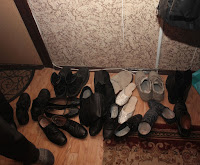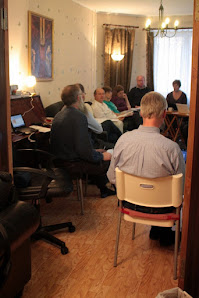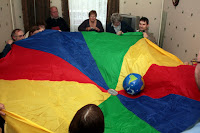Board meeting in our living room |
(I'm not qualified to assess the translation, which in this passage goes beyond what you'll find in the New International Version, or the New Revised Standard. What do you think?)
The scene that came back to me was a Bible study at the meetinghouse. During one of our frequent conversations on Friends understanding of Jesus, Deborah Haight said something I'll never forget: Friends don't have a low Christology; rather, we have a high anthropology. Our understanding of Jesus as the Christ is as exalted as other Christians'--but we have an equally high vision of human destiny.
Not that I have any illusions that I'm there yet!! But I do get little glimpses of what it would be like to live as freely as Paul promised (Romans 8:9-11, The Message):
But if God himself has taken up residence in your life, you can hardly be thinking more of yourself than of him. Anyone, of course, who has not welcomed this invisible but clearly present God, the Spirit of Christ, won't know what we're talking about. But for you who welcome him, in whom he dwells--even though you still experience all the limitations of sin--you yourself experience life on God's terms. It stands to reason, doesn't it, that if the alive-and-present God who raised Jesus from the dead moves into your life, he'll do the same thing in you that he did in Jesus, bringing you alive to himself? When God lives and breathes in you (and he does, as surely as he did in Jesus), you are delivered from that dead life. With his Spirit living in you, your body will be as alive as Christ's!Thanks to Deborah and other Friends in Ottawa, whose love and friendship made these promises real to me over 35 years ago! Now it's my turn to look at others with this same hope, this same love. Moscow Friends Meeting today is a small fraction of the size of Ottawa Meeting 35 years ago, but when I'm in worship with that little band of religious idealists, I'm overwhelmed by the joy of being among those "who welcome him." What can I do today to extend this welcome?
Paul is eloquent and passionate about our not making false distinctions among people, and our not one-upping each other or "deciding what's right for each other." See the whole of Romans chapter 14 for some great examples.
One of the painful areas where we are tempted to decide what's right for each other is how to overcome the poison of racism. We know that racism and colonialism sometimes clouded the witness of Friends (and other Christians) in the missionary movement. To what extent are we still experiencing bitter fruits?
The subject came up in David Johns' Theography blog:
Not long ago I had a conversation with three Quakers, each from a different part of the US. We talked about Friends in Kenya, the east African country where the largest concentration of Quakers live. I expressed my concerns about an upcoming seminary faculty trip there and how I did not want us to continue the long history of cultural imperialism that dishonors the Other by assuming we have what they need.Of course, assumptions are never safe. But, following Paul and his discussions on the Body, in fact we, as members of that Body, do have what "they" need, as "they" have what "we" need. The problem is, even though all cultures may have their strengths and weaknesses, we generalize too quickly about "we" and "they"--and we neglect the distortions in our assessments caused by wealth and power imbalances. And as soon as there's conflict, we add to these distortions by objectifying the "Other" and idealizing ourselves.
In the confrontation with racism and colonialism, there are no shortcuts--and I include the tempting path of appearing superior by charging others with racism. There's something diabolical about racism to begin with--it's a systemic demon that only collapses before genuine unity. To use the rhetoric of racism divisively is sadly ironic.
I contributed a few thoughts of my own to the ensuing lively discussion on David's blog. I also wrote some additional thoughts to some participants I know personally, along these lines:
I think it is sad that somehow all the (often misguided) efforts of Friends United Meeting to avoid and escape colonialism--sometimes by being too engaged, sometimes by not being engaged enough--are almost unknown. Instead, there's sometimes an assumption that, of course, FUM by its very nature must be colonialist. There's little or no awareness of the steps taken to hire Kenyan staff, to empower Kenyan leadership, to encourage North Americans to stand back, to make FUM a global body rather than a North American-centered body. I don't know how to assess FUM's failure in making these situations better known. If FUM (with the approval, of course, of its committees and boards) had publicized every experiment in post-colonial healing, leadership development, and instance after instance of corruption, would its reputation among its North American critics be higher, or even lower?
Many Kenyan Friends would in fact at least partially agree that there are Kenyan Friends who "can't be trusted." By this they don't mean that NO Kenyan Friends can be trusted; they might mean that a particular group of leaders, many of whom are compromised, cannot be trusted, and that in some yearly meetings this compromised group has, or had, monopolized leadership. FUM played into this problem in part by backing TOO FAR away when an honest, adult stance of mutual confrontation might have been better. Sometimes FUM Friends from North America have displayed colonialism, but at other times they've displayed an eagerness to curry favor with their "favorite" leaders, the ones who knew exactly how to flatter their visitors (or hosts). [Here, too, racism seeps in and distorts relationships.] And some Kenyan Friends know exactly when a charge of "colonialist" will take the wind out of a well-meaning North American who, when all is said and done, just wants to be liked. The flaws of those "compromised" Kenyan leaders range from sexism, nepotism, totalitarian management of pastors, sweetheart deals with politicians, financial corruption (the problem that almost killed Kaimosi Hospital AND Friends Theological College, and crippled the Turkana mission), and criminal conspiracy (in 1999, leaders of Nairobi Yearly Meeting operated a visa scam under cover of the FUM Triennial). I grew up in Chicago, so I am not under any illusion that Kenyan corruption is unique. Nor do I deny that FUM's leadership vacuum may have been the single most important factor leading to this state of affairs. But don't betray yet another generation of young Kenyan Quaker idealists by pretending that the corruption that they yearn to fight, in the face of apparent FUM indifference for decades, will now be swept under the rug yet again. Based on our experience of the past, those disillusioned Friends will find another fellowship in which to worship and serve.
David heard this comment, "They’re not ready yet to have leadership" and adds, "(Really? FTC was founded in 1942...that’s 68 years ago.)" I wonder what the original person meant by "they." If it's a blanket comment about all Kenyan Friends, then of course it is a blatant and poisonous over-generalization. If, however, he [or she] had a more specific group in mind, he or she might very well have been correct. There have in fact been many marvelous Kenyan leaders, including heads of schools. It is those places where North American money continued to flow where most of the problems have occurred (as far as we know). As for the year 1942, many far older institutions all over the world struggle with corruption and leadership development, too. I think that the statement deserves far more careful analysis than just "Really?"
Retha McCutchen once convened a meeting of Kenyan Quaker organizations who received FUM funds. She told them that they must spend designated funds or grants exactly as donors designated them. She was told by one Friend, "You don't understand. If we face financial distress, of course we will spend the money on salaries instead." She replied, "In that case you'll not get another penny." Other North Americans present expressed shock at this "colonialism," but Kenyans who were present said, more or less, "Exactly right. Corruption is ruining Kenya; we must take a stand." This is the kind of honest confrontation that MUST take place among adults who understand that conflict--even among people of different nationalities or races--is not the end of the world.
I'll never forget something that Jesse Jackson said at the Bicentennial Conference on Religious Liberty, held at Arch Street Meetinghouse in 1975. He said, "Racism didn't kill us, because cynicism got us first." In the fight against racism and colonialism among Friends, beware of letting cynicism replace discernment.
Finally, speaking of "welcome," more or less: Two weeks ago we housed two American citizens, members of our yearly meeting, in a local hotel here. No apparent problems (and I've stayed in that same hotel a number of times myself). A couple of months ago, we asked about reserving a block of rooms for a larger group, a mixed group of Russians and foreigners, participants in Friends House Moscow's annual board meeting. No problem! But just three days before the sessions were to begin, we were told that the hotel could not accept foreigners after all. The only explanation we could get was that it was not really a hotel, it was a "dormitory of the hotel type." Our international guests stayed at another place at three times the price. As one of our local friends said ironically, "We have a term for this: 'welcome to Russia'."
The whole incident had an unexpected blessing: instead of meeting in one of the "dormitory's" common rooms, the board accepted our invitation to meet in our living room. At peak attendance, fifteen people were stuffed into that room, all discussing quakerly topics, hearing Alternatives to Violence reports from local facilitators, making plans for next year, and enjoying meals together. I'm sure that an imprint of prayer and community-building will remain in the room for a long time to come.
Chris Hedges on "The World Liberal Opportunists Made," and a question and answer session.
A sad and thoughtful meditation on American politics today. I feel a bit more optimistic than poemless does, but most of all I yearn for an outbreak of common sense on U.S. election day. (Friday PS: Interesting graph for the common-sense crowd, if it exists.)
"My American Girl."
These blues are a bit different ... Straight from the Harp.




2 comments:
The quotation from Romans is quite
wonderful. It really sounds like
the earliest Quakers when they
wrote and spoke about Christ Within
inhabiting them with "celestial
flesh." Are there any Friends of
any sort nowadays who would talk
or write like this?
Jeremy Mott
Good question, Jeremy. Maybe Thomas Kelly (not exactly nowadays, I guess)? Or, more recently, Sandra Cronk?
I also appreciate your comments about the original posting by David Johns on his blog. He began by tackling the question of whether Kenyans are "ready" to lead such FUM-funded institutions such as the Theological College. But the whole discussion was structured in an unhelpful way, perhaps by the people he was talking with. If you asked the theoretical question of whether Kenyans exist who are competent to lead these institutions, I wonder whether those same people would have said "no." There's no doubt in my mind that there have been potential Kenyan leaders for these institutions all the way back to the first generation. There's a political dimension of the question that is obscured by the use of the word "ready."
We could also raise a whole line of inquiry about the validity or sustainability of importing a traditionally European-style institution and expecting it to run exactly the same way in another setting. (Come to think of it, how often do Western institutions run perfectly in Western settings??)
But aside from that, the issue isn't "readiness" of this or that nation or ethnic group to produce leaders. The bigger issue--in Chicago as well as Nairobi--is whether decision-making processes are trustworthy. Or "is the fix in"? "Fixes" vary from place to place depending on local factors and patterns, but the temptation to use them is probably universal.
Post a Comment